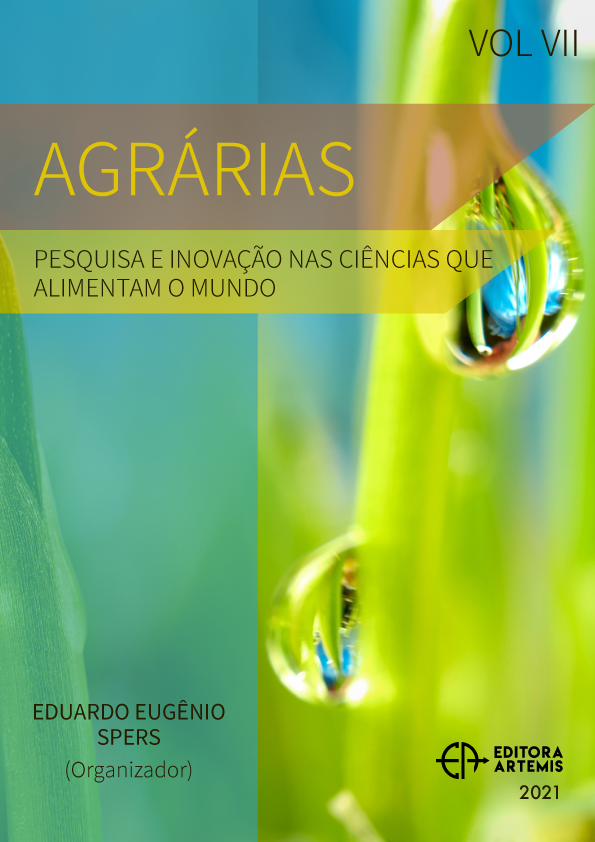
COEFICIENTE DE TOLERÂNCIA AO CALOR DE CABRAS MESTIÇAS CRIADAS NO MUNICÍPIO DE CAXIAS – MA
Objetivou-se avaliar a tolerância ao calor de caprinos mestiços criados no município de Caxias (MA), bem como correlaciona-lo com índices produtivos. A pesquisa foi desenvolvida no setor de caprinocultura do IFMA Campus Caxias utilizando-se 14 caprinos mestiços em idade adulta, dos quais foram mensurados: temperatura retal (TR), peso corporal e comprimento corporal (CC). Foram calculados o coeficiente de tolerância ao calor (CTC), o ganho de peso diário (GPD) e o índice de compacidade corporal (ICC). Os dados foram utilizados para análise estatística descritiva, análise de variância, comparação de médias pelo teste de Tukey a 5% e correlação de Pearson. Observou-se uma média de CTC de 88,87. Este valor é um indicativo de que o rebanho encontra-se adaptado as condições térmicas nas quais estão sendo criados. Os valores médios de CTC nos períodos seco e chuvoso não apresentaram diferenças significativas. Os animais apresentam um CTC de 85,65 % no período matutino enquanto que no turno vespertino registrou-se um maior valor 90,68%, evidenciando a capacidade de controle térmico dos animais, mesmo sob temperaturas ambientais mais elevadas. O cálculo do coeficiente de tolerância ao calor é um bom indicativo da adaptabilidade fisiológica de caprinos mestiços submetidos às condições climáticas adversas. O coeficiente de tolerância ao calor está negativamente relacionado com avaliações corporais e peso corporal ou apresenta pouca relação com características produtivas em caprinos mestiços. Estas correlações negativas provavelmente são consequências das perdas de peso ocorridas durante o período experimental.
COEFICIENTE DE TOLERÂNCIA AO CALOR DE CABRAS MESTIÇAS CRIADAS NO MUNICÍPIO DE CAXIAS – MA
-
DOI: 10.37572/EdArt_18122151425
-
Palavras-chave: Bioclimatologia; Caprinocultura; Coeficiente de Tolerância ao Calor
-
Keywords: Bioclimatology; Goat farming; Heat Tolerance Coefficient
-
Abstract:
The objective was to evaluate the heat tolerance of crossbred goats raised in the city of Caxias – MA, as well as to correlate it with production rates. The research was developed in the goat farming sector of the IFMA Campus Caxias using 14 crossbred adult goats, of which the following were measured: rectal temperature (TR), body weight and body length (CC). The heat tolerance coefficient (CTC), the daily weight gain (GPD) and the body compactness index (ICC) were calculated. Data were used for descriptive statistical analysis, analysis of variance, comparison of means by Tukey test at 5% and Pearson correlation. An average CTC of 88.87 was observed. This value is an indication that the herd is adapted to the thermal conditions in which they are being raised. The mean values of CTC in the dry and rainy periods did not show significant differences. The animals have a CTC of 85.65% in the morning, while in the afternoon shift there was a higher value of 90.68%, evidencing the animals' thermal control capacity, even under higher environmental temperatures. The calculation of the heat tolerance coefficient is a good indication of the physiological adaptability of crossbred goats related to adverse weather conditions. The heat tolerance coefficient is negatively related to body assessments and body weight or has little relationship with productive characteristics in crossbred goats. These negative correlations are likely a consequence of the weight losses that occurred during the experimental period.
-
Número de páginas: 18
- Alecx Mikael Carvalho da Silva
- Luiz Antonio Silva Figueiredo Filho

